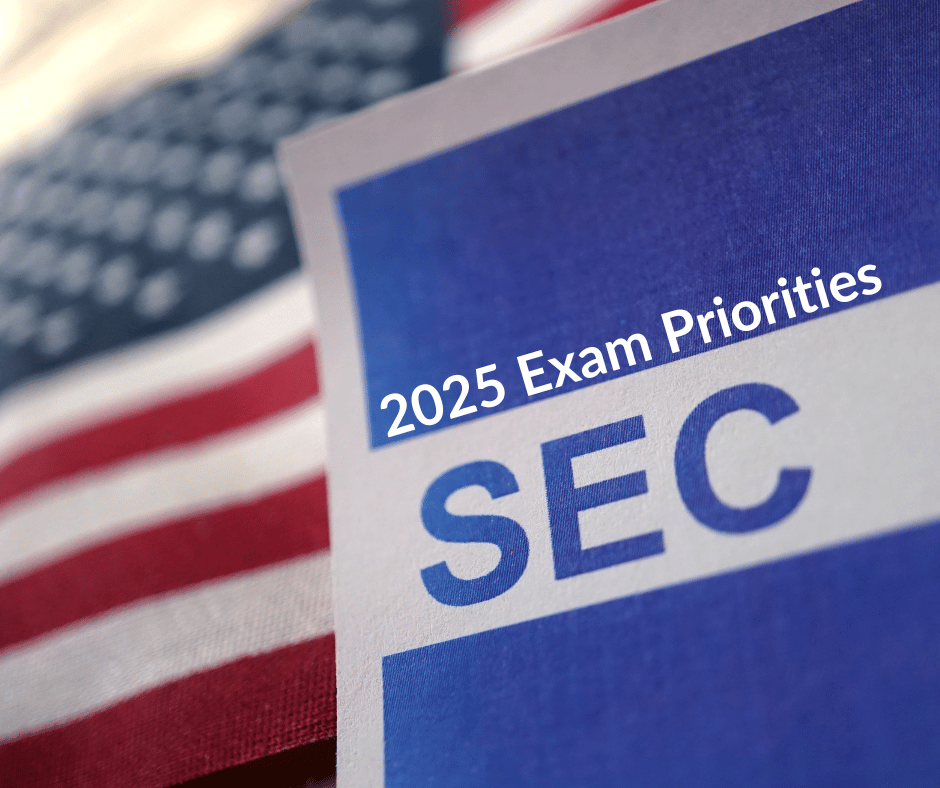SEC’s 2025 Examination Priorities for RIAs and Broker-Dealers

Have you been paying attention?
The SEC’s Division of Examinations has outlined its 2025 examination priorities, highlighting areas that pose heightened risks to investors and the U.S. capital markets. For Registered Investment Advisers (RIAs) and broker-dealers, understanding and preparing for these focal areas is essential to maintain regulatory compliance and minimize operational risks.
Here’s a breakdown of the key SEC priorities that RIAs and broker-dealers should keep in mind for 2025:
1. Adherence to Fiduciary Standards and Conflicts of Interest
For RIAs, fulfilling fiduciary duties remains a top priority for the SEC in 2025. The SEC will scrutinize RIAs’ adherence to their duty of care and loyalty to clients, ensuring that advisers act in their clients’ best interests and disclose all potential conflicts of interest.
Examiners will focus particularly on:
- High-cost and unconventional products: Advisers are expected to demonstrate why specific products, such as illiquid assets or interest-rate-sensitive investments, align with clients’ needs.
- Conflicts of Interest in Dual Registrants: For RIAs affiliated with broker-dealers, the SEC will assess conflict disclosures and ensure that advisory recommendations are suitable for client accounts.
- Fee Arrangements: The SEC will review non-standard fee arrangements and their impact on impartial advice. This includes ensuring clients understand all associated costs and conflicts.
2. Effectiveness of Compliance Programs
Rule 206(4)-7 under the Advisers Act mandates that RIAs implement comprehensive compliance programs. In 2025, the SEC will prioritize evaluating the effectiveness of these programs, particularly in areas like marketing, portfolio management, disclosures, and custody of client assets. Examiners may place added emphasis on firms employing AI in portfolio management and advisers utilizing independent contractors in multiple locations, given the potential for unique compliance challenges. Annual compliance reviews will be closely examined to ensure these programs are effectively identifying and mitigating risks.
3. Focus on Private Fund Advisers
Private fund advisers remain under the SEC’s microscope in 2025, especially those managing funds with volatile or illiquid assets. Examiners will assess if private fund advisers have met their fiduciary duties during market fluctuations, maintained accurate fee and expense calculations, and managed conflicts of interest.
Areas of focus will include:
- Interest rate-sensitive assets: Advisers to funds with real estate or private credit investments will face heightened scrutiny due to market volatility.
- Fee Transparency: Accurate and transparent calculations of fund-level and investment-level fees are essential to ensure fair client treatment.
- New SEC Rules: Compliance with the latest SEC marketing rules and amendments to Form PF will also be reviewed.
4. Regulation Best Interest (Reg BI) Compliance for Broker-Dealers
For broker-dealers, Reg BI compliance is a critical area of examination. The SEC will assess broker-dealers’ adherence to Reg BI by evaluating the suitability of their recommendations for complex, high-risk products, such as crypto assets, inverse funds, and alternative investments. The examination process will also include a thorough review of disclosures, conflict management practices, and the overall alignment of broker recommendations with clients’ best interests.
Particular attention will be paid to:
- Complex Product Recommendations: Examinations will focus on products like leveraged or exotic investments, which can pose significant risks to retail investors.
- Conflict Mitigation and Disclosure: Broker-dealers must demonstrate clear policies to manage and disclose conflicts of interest.
- Digital Engagement Practices: Broker-dealers utilizing digital platforms or robo-advisors to engage with retail investors will face additional scrutiny, ensuring automated advice aligns with clients’ goals.
5. Cybersecurity and Operational Resiliency
Cybersecurity continues to be a top priority as cyber threats escalate across the financial services sector. The SEC will examine RIAs and broker-dealers for adequate policies and practices to safeguard customer data and ensure operational continuity during disruptions.
Areas of focus include:
- Data Protection: Firms must have robust systems for preventing unauthorized access and protecting client information.
- Third-Party Risks: The SEC will review how firms manage and monitor third-party services, especially those essential to operational resilience.
- Incident Response: With new amendments to Regulation S-P, the SEC will expect firms to implement incident response programs tailored to identify, respond to, and recover from cybersecurity incidents.
6. Other Emerging Financial Technology and AML Risks
As financial technology rapidly evolves, the SEC remains vigilant on risks associated with automated investment tools, artificial intelligence (AI), and digital trading platforms. Examiners will evaluate the accuracy of disclosures around the use of AI, algorithmic tools, and digital advisory services to ensure they are in line with investor expectations and regulatory requirements.
Additionally, compliance with Anti-Money Laundering (AML) obligations is a core focus area for the SEC in 2025. Broker-dealers and RIAs offering services that pose higher AML risks will need to ensure comprehensive AML programs tailored to their unique risks and customer profiles.
To remain compliant and reduce examination risk in 2025, RIAs and broker-dealers should take proactive steps to:
- Strengthen Compliance Programs: Regularly review and update compliance procedures, particularly in areas the SEC has emphasized, such as fiduciary duty and Reg BI.
- Enhance Cybersecurity Measures: Evaluate and reinforce cybersecurity frameworks, ensuring they address both internal and external risks.
- Prioritize Transparency and Disclosure: Clear, detailed disclosures regarding conflicts of interest, fees, and complex products are critical to meeting SEC expectations.
- Monitor Fintech Risks: For firms leveraging AI or automated advisory tools, ensure policies accurately reflect capabilities and regulatory obligations.
By focusing on these priorities, RIAs and broker-dealers can better navigate the SEC’s 2025 examination priorities, stay compliant, and continue to build trust with their clients in a dynamic regulatory landscape.
